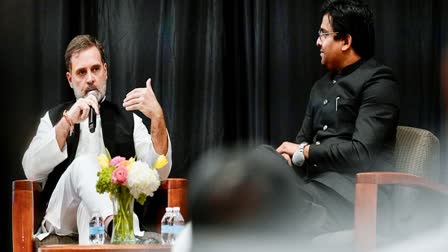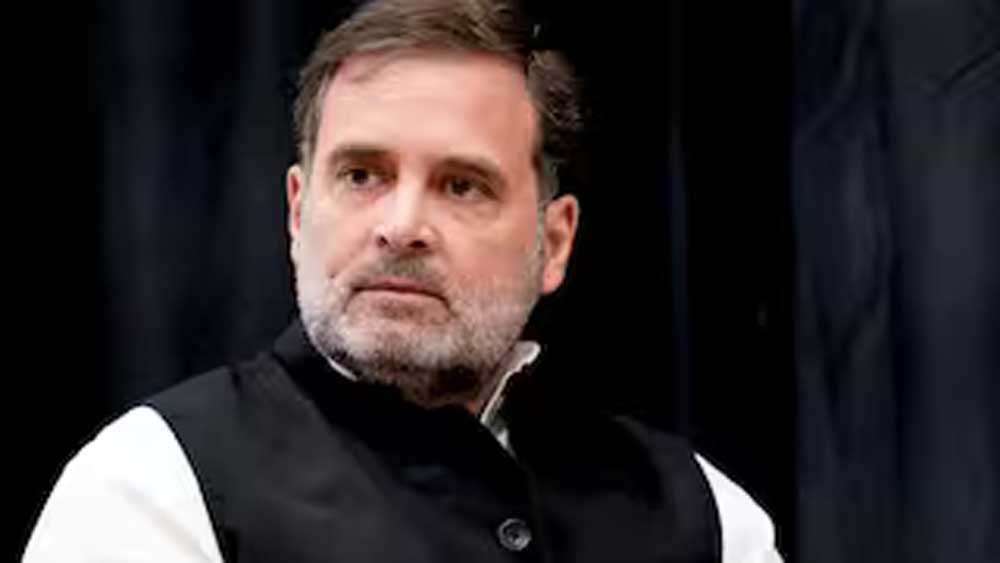In a recent series of events, Congress leader Rahul Gandhi has once again targeted the Rashtriya Swayamsevak Sangh (RSS), sparking a heated exchange with the Bharatiya Janata Party (BJP). His comments, particularly those concerning the Sikh community, have drawn sharp reactions from BJP leaders, escalating the political discourse in India.
Rahul Gandhi’s Remarks
During a gathering of Indian Americans in Herndon, Washington DC, Rahul Gandhi accused the RSS of considering certain religions, languages, and communities as inferior. He emphasized that the ongoing struggle in India is not merely political but fundamentally about the rights and freedoms of various communities, including Sikhs. Gandhi highlighted the importance of allowing Sikhs to practice their faith freely, including wearing turbans and kadas, which are integral to their religious identity.
Gandhi’s remarks were part of a broader critique of the RSS and its influence on Indian society. He accused the organization of undermining India’s pluralistic ethos by promoting a singular cultural and religious narrative. According to Gandhi, this approach threatens the country’s rich diversity and the rights of minority communities.

BJP’s Response to Rahul Gandhi’s comments
The BJP was quick to respond to Gandhi’s comments. Union Minister Hardeep Singh Puri condemned Gandhi’s statements, calling them “sinister” and accusing him of spreading falsehoods about the Sikh community. Puri reminded the public of the 1984 anti-Sikh riots, which occurred under Congress rule, and questioned Gandhi’s credibility on issues concerning Sikhs.
Puri’s response was echoed by other BJP leaders, who accused Gandhi of attempting to create divisions within the country. They argued that the RSS has always respected India’s diversity and that Gandhi’s comments were an attempt to malign the organization for political gain.
Historical Context
The tension between the Congress party and the RSS is not new. The RSS, founded in 1925, has long been a proponent of Hindutva, an ideology that seeks to define Indian culture in terms of Hindu values. The Congress party, on the other hand, has traditionally championed a secular and inclusive vision of India. This ideological clash has often led to confrontations between the two entities.
The 1984 anti-Sikh riots remain a significant point of contention. Following the assassination of Prime Minister Indira Gandhi by her Sikh bodyguards, violent riots broke out, leading to the deaths of thousands of Sikhs. The Congress party has been widely criticized for its handling of the situation, and the BJP frequently references this event to question the Congress’s commitment to minority rights.
The Broader Implications
Gandhi’s recent comments and the subsequent backlash from the BJP highlight the deep-seated ideological divide in Indian politics. The RSS and BJP’s vision of India as a Hindu-majority nation with a unified cultural identity contrasts sharply with the Congress’s vision of a secular, pluralistic society.
This ideological battle has significant implications for India’s social fabric. The RSS’s influence on the BJP and its policies has been a point of concern for many who fear that it could lead to the marginalization of minority communities. On the other hand, supporters of the RSS argue that it promotes national unity and cultural pride.
Public Reaction
Public reaction to this latest exchange has been mixed. Supporters of the Congress party and secularism have praised Gandhi for speaking out against what they see as the RSS’s divisive agenda. They argue that his comments highlight the need to protect India’s diversity and ensure that all communities feel respected and included.
Conversely, supporters of the BJP and RSS have defended the organizations, arguing that they have always worked for the betterment of the nation. They accuse Gandhi of playing divisive politics and attempting to gain political mileage by attacking the RSS and BJP.
The Role of the Media
The media has played a crucial role in shaping public perception of this issue. Coverage of Gandhi’s comments and the BJP’s response has been extensive, with news outlets providing detailed analyses and opinions. This media attention has amplified the political discourse, bringing the ideological battle between the Congress and RSS to the forefront of national conversation.
For More News Update, Follow Read Now News
